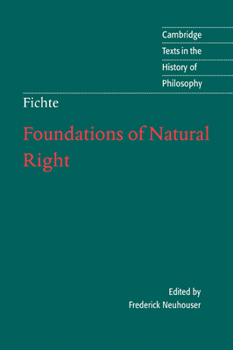Foundations of Natural Right
Select Format
Select Condition 
Book Overview
Fichte's thought marks a crucial transitional stage between Kant and post-Kantian philosophy. Foundations of Natural Right, thought by many to be Fichte's most important work of political philosophy,... This description may be from another edition of this product.
Format:Paperback
Language:English
ISBN:0521575915
ISBN13:9780521575911
Release Date:September 2000
Publisher:Cambridge University Press
Length:380 Pages
Weight:2.05 lbs.
Dimensions:0.9" x 6.1" x 9.0"
Customer Reviews
2 ratings
A groundbreaking & powerful study of the intersubjective conditions of right that make freedom and
Published by Thriftbooks.com User , 14 years ago
We take freedom for granted, as if it were easily understood and readily actualized. Genuine freedom, and not the empty and abstract ideal of the kind of freedom we presume ourselves to possess automatically, cannot in fact be realized except when a range of conditions are met, including a number of conditions that we might take to be impositions on freedom (such as the existence of laws and police to enforce them). Fichte's groundbreaking study aims to articulate for the first time, just after the French Revolution, before Hegel or Marx (and even before Kant's discussion of rights), and of course long before Rawls and others like him who've worked on similar problems with varying degrees of insight, the terms in which rights and freedom can properly be understood and actualized in the modern state. It's a difficult read, but incredibly rewarding for those who approach it in the right way, as a philosophical study of what really must be in place for freedom to be possible, rather than a political treatise on a certain dead guy's opinions regarding legal principles. Fichte himself marks out the difference in his introduction between reading a text philosophically and reading it idly: in the latter case, you read the text as an outline of something it is possible to think; to read this study philosophically, by contrast, is to read it to discover what you have to think, because its concepts have an object, namely the world we live in articulated in such a way that through these concepts its structure can be seen as if for the first time. In other words, to read a philosophical text like that of Fichte is to rediscover the reality one inhabits, and to grasp it and learn to assess it in ways one hadn't been able before. The familiar part of the argument is that freedom, considered as the ability to make a difference in the world, presupposes a world to act upon that is more or less predictable. But in a world with other people my free capacity to act upon the world and realize my purposes therein is limited and conditioned by that of others. So there is a need to establish laws and structures that we each freely endorse and that are enforced by a state power, defining precisely what is permissible for each of us and what are the boundaries that define where my property and my potentials stop and where those of others begin. Some of the implications are that property owners should have good fences to make their property limits obvious; travelers and those who write checks should carry identification cards, certified by the state, so that people aren't duped out of their livelihoods; the state should guarantee a living wage to those who are willing to work. So far, and if you read it only for this core argument and for the specific ways he spells out the application of this core argument, Fichte might sound like he's simply working in the vein of social contract theory, taking a bit from Hobbes and Locke and, especially, Rousseau and addin
A fascinating exploration of freedom and community
Published by Thriftbooks.com User , 23 years ago
This work is an impressive attempt to establish the philosophical foundations of a modern, liberal political system--that is, a community of free beings who grant each other mutual recognition and rights. Fichte's particular political theories (including the notion of an "ephorate" and his disappointingly traditional views on women and marriage) are mostly of historical interest, but his initial analyses of "the I," of freedom, and of the concept of right are some of the best statements of his general philosophical position. His prose is often awkward and frustrating, but the passion and seriousness of his thought makes the book engrossing reading nevertheless. Michael Baur's translation is careful, and Frederick Neuhouser's introduction and notes are very helpful.





